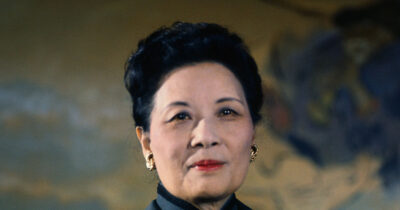
A legacy of health! Soong Mei-ling – longevity and fight against cancer
When the world remembers Soong Mei-ling, better known as Madame Chiang Kai-shek, the image that comes to mind is that of elegance, strength, and extraordinary endurance. She wasn’t just the wife of one of China’s most powerful political leaders — she was a force in her own right, a diplomat, humanitarian, and symbol of resilience during some of the most turbulent decades of the 20th century.
But beyond politics and power, Soong Mei-ling’s longevity and vitality have fascinated generations. Diagnosed with cancer at age 40, she not only survived but thrived for another six decades, passing away peacefully in 2003 at the remarkable age of 106.
How did she do it? Her story offers more than a history lesson — it’s a study in discipline, balance, and the quiet strength of daily habits.
A Woman of Strength and Influence
Born in 1898 into the wealthy Soong family of Shanghai, Soong Mei-ling was raised in privilege but also in purpose. Her father, Charlie Soong, was a successful businessman and Christian missionary who valued education and reform. All three Soong sisters — Ai-ling, Ching-ling, and Mei-ling — would go on to shape China’s history in their own ways.
Mei-ling studied in the United States, graduating from Wellesley College with honors, fluent in English and Western thought. When she married Chiang Kai-shek in 1927, she became not only China’s First Lady but also its bridge to the West.
She spoke before the U.S. Congress, lobbied for aid during World War II, and became a powerful voice for her country on the world stage. Yet behind the polished poise was a woman fighting a private battle for her health — and, eventually, mastering it.
The Cancer Diagnosis That Changed Everything
At 40, Soong Mei-ling received the news that would terrify anyone: she was diagnosed with cancer. At a time when medical options were limited, her survival seemed uncertain. But rather than succumb to fear, she turned inward — blending modern medicine with the principles of Traditional Chinese Medicine (TCM), guided by an unwavering belief in balance and prevention.
That diagnosis became a turning point. She began to live her life with deliberate care — every meal, every hour of sleep, every thought directed toward sustaining health and harmony.
The Discipline Behind Her Longevity
Those close to Soong Mei-ling describe her lifestyle as almost ritualistic. She believed that consistency was the foundation of health.
Her daily schedule was meticulously structured. She went to bed at 11 p.m. sharp and woke up at 9 a.m., giving her body the full recovery time she considered essential. Each morning began with a glass of cold water with lemon, a cleansing ritual meant to awaken the body’s metabolism and clear the mind.
She avoided late-night banquets and heavy meals. Instead, she followed the Chinese principle of “chi fen bao” — eating only until about 70% full. This self-control, she believed, kept both her digestion and her spirit in balance.
Instead of three large meals, she ate five small ones throughout the day, maintaining steady energy without ever feeling sluggish. It’s a principle that modern nutritionists now confirm supports better metabolism and longevity.
A Diet Rooted in Simplicity and Nature
Soong Mei-ling’s diet was an elegant blend of Eastern wisdom and natural simplicity.
She emphasized fruits like kiwis, pineapples, and lychees, all rich in vitamin C and antioxidants. Her favorite vegetable, however, was celery — a humble yet powerful ingredient in Traditional Chinese Medicine.
Celery, known for its cooling and detoxifying properties, is said to support heart health, reduce blood pressure, protect vision, and fight inflammation. Modern research confirms many of these benefits, linking celery to improved cardiovascular and liver function.
Another staple was spinach, a food she praised for its strength-giving qualities. Spinach provided her with protein, iron, calcium, and B vitamins — nutrients that helped prevent fatigue and maintain bone health. She believed it kept her “youthful and sharp,” even into her nineties.
She strictly avoided processed foods, fried dishes, and excess sugar. Instead, she favored light broths, steamed vegetables, and fresh fruits, often seasoned simply with ginger, garlic, and sesame oil.
Her meals reflected her philosophy: food was not indulgence, but medicine.
The Power of Mind and Routine
But her health wasn’t built on diet alone. Soong Mei-ling believed equally in mental nourishment. She dedicated at least two hours each day to creative or intellectual activities — painting, calligraphy, and reading poetry.
“Stillness is strength,” she once said. “When the mind rests, the body heals.”
She practiced meditation and breathing exercises, likely influenced by qigong principles, to maintain inner calm and emotional stability — traits that served her well amid the political storms that surrounded her life.
Her poise and serenity were not accidents of temperament; they were cultivated disciplines.
Traditional Medicine Meets Modern Wisdom
Even as Western medicine advanced, Soong Mei-ling remained devoted to Traditional Chinese Medicine. She viewed the human body as a living ecosystem — a balance of yin and yang, harmony between organ systems, and alignment between mind and spirit.
Rather than treat illness reactively, she believed in preventive living — regulating sleep, emotions, and digestion long before imbalance could take root.
It’s an approach modern health experts increasingly endorse. Studies now support many of the practices she lived by: hydration with lemon water, portion control, plant-based meals, and consistent rest are all proven to promote longevity.
The Woman Who Outlived a Century
By the time Soong Mei-ling passed away in 2003 in New York City, she had lived through three centuries, witnessed revolutions, wars, and the rise of a new China. Few figures from her era lasted as long — physically, intellectually, or historically.
She attributed her long life not to luck but to discipline, moderation, and gratitude.
“She believed that health was a moral responsibility,” said one historian. “To care for your body was to respect the life you’d been given.”
Lessons from a Century of Strength
Soong Mei-ling’s story is more than a tale of survival — it’s a reminder that longevity is not an accident. It’s the result of deliberate choices, small but consistent, made every day.
Her habits — eating clean, sleeping deeply, thinking clearly — seem simple, almost old-fashioned. Yet they formed the foundation of a life that spanned 106 years and defied both disease and time.
Her life serves as an example that health and grace aren’t inherited privileges; they are legacies we build through mindfulness, discipline, and respect for the body’s natural rhythm.
Even today, modern wellness experts and everyday people alike find inspiration in Madame Chiang’s story. In an era of shortcuts and chaos, her message remains timeless: health begins with harmony — in body, mind, and spirit.




